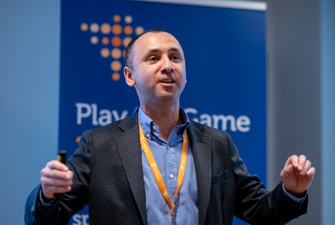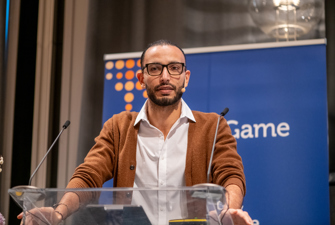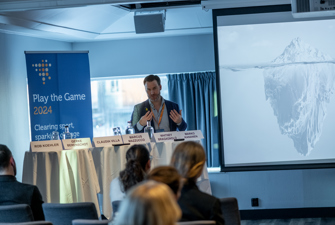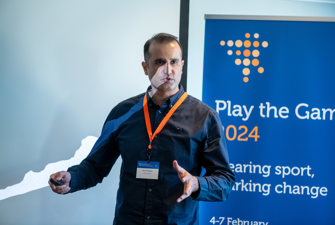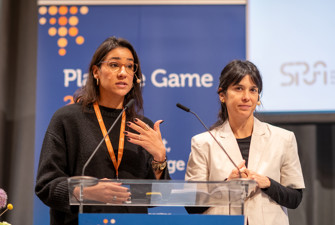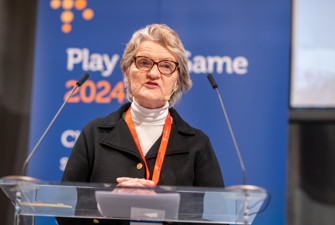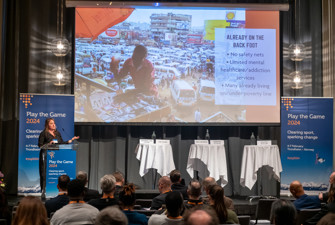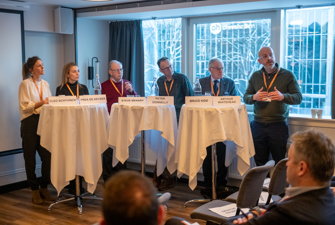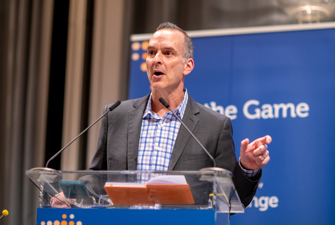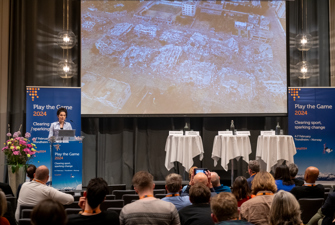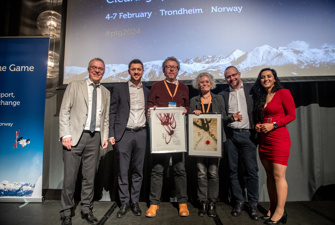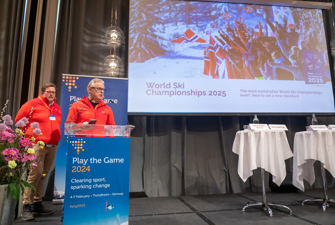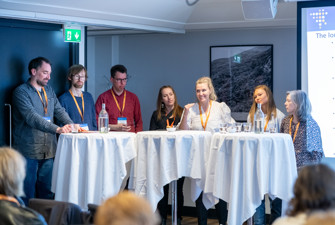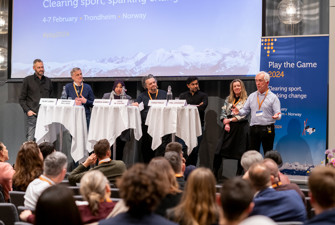Session on illegal gambling exposed the fallacy of betting as a victimless crime
The activities of illegal betting companies are creating social chaos from Africa to Asia. In the Philippines, the industry enslaves thousands of Chinese workers, and in Africa betting companies are trying to trap young Africans into gambling.
Football’s commercial relationship with illegal betting operators and the devastating social chaos they leave in their wake was exposed in gruesome detail on the first day of Play the Game 2024.
In a session on illegal gambling in sport and the trillion dollar question that no-one seems to grasp, French journalist Philippe Auclair detailed how illegal betting companies that advertise on the shirts of many top European club clubs are having a merciless impact in the Philippines, where many are based.
“These are not people who are just filling a gap in the market, that’s not the case, these are people who are kidnapping, torturing and killing people,” said Auclair.
Betting operators are defined as illegal under the Council of Europe’s Macolin Convention on the manipulation of sports competition if they operate in a country where sports betting activity is not allowed under the “applicable law of the jurisdiction where the consumer is located.”
These illegal firms use a loophole in British gambling regulation to obtain licences that allow them to advertise on the shirts of major European clubs, whose games attract massive followings as well as betting activity in Asia, and China in particular.
These shadowy outfits are known as Philippines Online Gambling Operators (POGOs) after the country where their operations are located, and their activities are having a savage impact.
The rise of cyber slave compounds
Auclair added: “The explosion of sports betting has seen thousands of Chinese-speaking people being brought into Manila for IT and customer relations. People are brought in to work illegally. Mostly young men, some that think they are getting a great job, some with gambling debts, who find themselves trafficked."
“There are now 250,000 illegal Chinese workers in Manila and there has been a huge rise in prostitution. Thousands of women are forced into prostitution. The POGOs need the prostitutes for their workers but they are also organising them and making money from them.”
The audience were shown graphic images of a fight between rival POGO gangs that resulted in a murder, busts by Filipino police that unearthed shocking tools used to torture workers that step out of line and one series showing a man trying to escape then recaptured.
“We don’t know what happened to him but we can only guess,” reflected Auclair, who has covered the subject for the last two years as part of a team working for Josimar magazine.
“These POGOS are the people who have the logos that you see on the shirts, sleeves and LED boards in Britain, Spain and Italy. These are the people we are talking about.”
The problem has spread across South East Asia, where young people, mostly men, are trapped in cyber slave compounds and forced to work for illegal betting companies. One compound was run by a company, Great Wall Corporation, which has been linked to 8XBet, who sponsor English Premier League champions.
“This could not have happened if football had not decided to enter into a toxic relationship with these people,” added Auclair. “This is a problem specific to Britain. It’s a regulatory problem because the British Gambling Commission are judge and jury; they have no oversight. It’s a unique situation in the European landscape.”
A swathe of Premier League teams have sponsorship deals with illegal operators, but only three clubs have ever responded to questions from Auclair’s team about their relationships.
All three responses were ‘no comment’. In contrast, seven out of 11 German Bundesliga clubs produced details replies and one ended their sponsorship with an illegal betting firm.
An Armenian match-fixer with a teddy bear
Illegal betting companies play a crucial role in match fixing because they do not co-operate with law enforcement or report suspicious bets that may indicate manipulation.
The size of the illegal betting market was recently gauged at $1.7m by the United Nations Office on Drugs and Crime.
The scale of proceeds from match-fixing is even harder to pin down, but Corentin Segalen, coordinator of the French National Platform against Sports Manipulation, revealed the net gain from one criminal group in Austria was 400 million euros over three years.
In his presentation, Segalen broke down the process fixers undertook to manipulate games and said that the best way to fight fixing was to encourage whistle-blowers.
The key to the arrest and conviction of the Armenian tennis fixer known as Maestro, who controlled a huge empire of low level players, was seizing the Belgian-based criminal’s four mobile phones.
“We seized Maestro before he could go into his bathroom and throw his phones down the toilet,” recalled Ann Lukowiak, a prosecutor from Belgium, who helped bring down Maestro’s ring.
The phones revealed a swathe of incriminating details that helped convict Grigor Sargsyan, who – Lukowiak revealed – slept with a teddy bear and sent the Belgian prosecutor a selfie on his way to prison.
Fellow Belgian federal prosecutor Frédéric Van Leeuw opened the panel by warning of the catastrophic impact of normalising corruption in sport.
“How many times have we been told ‘but everyone does it’,” said van Leeuw.
“Many people prefer to carry on dreaming rather than look behind the scenes. Globalisation has atrophied. Justice and ethics have remained local, while globalisation has grown without a soul.”
Betting companies look for new markets in Africa
The impact of the unhindered global activities of illegal betting operators in Africa was exposed by filmmaker Zoe Flood, whose work in Uganda also found devastating social problems.
Ms Flood explained: “In the same way as alcohol and tobacco sought new markets in Africa as regulation tightened in their existing markets, so has betting. In a lightly regulated market, there is more space to exploit the consumer.”
“We found licenced operators with questionable people behind them and a massive disregard for the age of bettors."
“Young people are coming of age but encountering massive barriers to work and that is making betting attractive. We found lots of young men who thought they could use their knowledge of football to make money, but the fact is that it was very hard to find anyone that had made money out of betting."
“What we did find was that people are losing money hand over fist and that was not spare money, it was money for food.”
